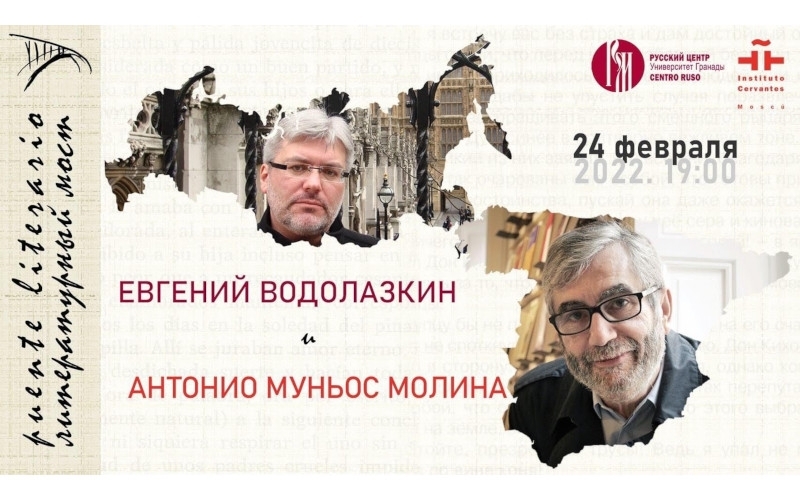
On February 24, 2022, the partners of the Eurasian Peoples’ Assembly, the Russian Center of the University of Granada and the Cervantes Institute in Moscow, held the first meeting opening the new project “Spain and Russia. Literary Bridges”.
Within this project, a series of meetings of writers from Spain and Russia, literary "bridges" between the two countries, will be held.
On Thursday, February 24, 2022, at 21:00 (Moscow time), literature lovers witnessed a conversation between two living classics - the Spaniard Antonio Muñoz Molina and the Russian writer Evgeny Vodolazkin.
Evgeny Vodolazkin spoke in the assembly hall of the Faculty of Translation of the University of Granada (Moscow, Russia), and Antonio Muñoz Molina joined via videoconference from Madrid (Spain).
The choice of these particular masters of the word was unusually successful: Evgeny Vodolazkin, presented a translation of his novel “Laurus” in Spain and, being a specialist in medieval culture, he was inspired to write the novel by the genre of the life of the saints, spoke about how this technique helped him create an unpretentious, but an extremely sincere image of a “positively beautiful” person. And his Spanish colleague spoke about how the genre of documentary journalism and his desire to accurately reflect the current moment help him create novels that are also translated into many languages brought him recognition from readers around the world.
The spectators who joined the conference witnessed these two unfamiliar and seemingly different creators picked up each other's thoughts, supplementing and deepening them in the process of exchanging opinions. They talked about what music and novels about musicians mean to them: "Winter in Lisbon" by Antonio Munoz Molina and "Brisbane" by Evgeny Vodolazkin. And it turned out that this is the art that they both dream of; an appeal to the past (in Evgeny Vodolazkin's Lavra and in Antonio Muñoz Molina's Sefarad). The writers also agreed that this is a way to acquire a personal identity. They also talked about the role of detail and nuance in the narrative - for both it is a prism in which great processes are reflected. It's the details that make the story human.
The last question, which was asked by the director of the Russian Center Enrique Hervilla, made the participants of the dialogue formulate their idea of what foreign (Spanish and Russian) readers can find in their works. And again, the opinions of Evgeny Vodolazkin and Antonio Munoz Molina agreed. They expressed a similar idea that otherness and the discovery of other worlds attract any true connoisseur of literature, who finds in them important answers to personal questions.
It can be said with all certainty that the first literary bridge within the planned Spanish-Russian project was built and gave rise to a new and fruitful dialogue between our cultures.


